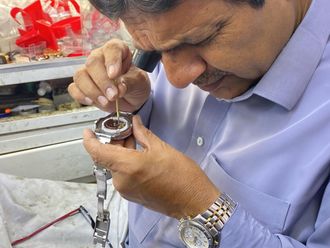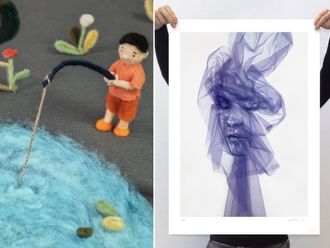
What happens when you lose yourself in a relationship?
Dubai-based Varun Kishore (name changed on request) admits he lost sight of himself after marriage. Fifteen years ago, he married his childhood friend, after a turbulent courtship, filled with multiple separations and reconciliations. Yet, they, along with everyone believed that it was nothing less than an idyllic marriage. Haven’t films taught us to believe that love finds a way, and happily-ever-afters exist? Kishore and his wife believed too. Kishore reflects, “Yet, it started feeling as if we had never left high school." The fights remained, becoming more bitter and unpleasant as time went on, and even the vestiges of their affection were gradually swept away.
He thought that the ‘drama’ and fights were keeping their relationship alive, as they would reconcile immediately. For instance, she would leave home at any cause, expecting him to bring her back, and gradually, his will to do so diminished. Gradually, a sense of weariness prevailed; they just wanted to escape the home and each other. Afraid of admitting it, they grew more frustrated with each other, saying regrettable words that they couldn’t retract.
Yet, Kishore remains rather perplexed why and how they brought out the ‘worst’ in each other. “We were doing well in our careers. Everyone else liked and respected us; they would come to us for help and we would guide them through problems. Yet, together, we didn't seem to have the semblance of the maturity we showed others; we were a disaster, always fighting. We were petty and so hurtful. Yet, we tricked ourselves into believing that fights were a sign of a healthy marriage. I didn’t know that we were just turning our relationship into an emotionally immature and toxic bond,” he says.
Sometimes, we really never see the signs. Yet, what is an emotionally immature relationship? How can you know if you are in one?
In the moment: The various manifestations of emotional immaturity
Kirin Hilliar, a professor in psychology, Dubai, points out that while we often excel at giving advice to others, we struggle to apply the same objectivity to our own relationships. "We might be emotionally intelligent people otherwise, empathetic and caring. Yet, in that moment of a heated argument or disagreement, we get triggered. We feel criticised, so we want to justify ourselves. In the moment, we don’t want to leave a fight feeling like we ‘lost’,” she says. We’re trapped in justifications, fights, and conversations that don’t lead to any solution but breed more anger, creating an emotionally immature relationship, between otherwise, probably two mature people.

We might be emotionally intelligent people otherwise, empathetic and caring. Yet, in that moment of a heated argument or disagreement with a partner, we get triggered. We feel criticised, so we want to justify ourselves. In the moment, we don’t want to leave a fight feeling like we ‘lost', so we get defensive...
Emotional immaturity in a relationship can manifest in various ways. “For example, if a person’s uncomfortable and feeling attacked, they’ll retaliate. If they feel overwhelmed, they’ll cry. And if they cry every time an argument takes place, the other person feels manipulated and decides to not have an argument,” explains Hilliar.
An emotionally immature relationship can include a variety of behavioural patterns, including the unwillingness to concede in an argument, not picking up on important cues, or paying attention to the body language of a partner. Instead, as the focus keeps shifting from problem-solving into just accusations and arguments, the relationship turns toxic.
Why does a relationship turn toxic?

As psychologists explain, emotional immaturity, while often overlooked, can be a significant barrier to healthy and fulfilling relationships. In the plain sense of the phrase, emotional immaturity refers to an individual's inability to manage their emotions effectively, communicate openly, and empathise with others. When these behaviours manifest in a relationship, owing several reasons including past unaddressed grievances and wounds that just deepen with time, intrinsic personality traits.
Emotional immaturity can develop in any relationship, even those that initially seem healthy. Kirsten Rowen, an Abu Dhabi-based psychologist, explains that the reasons for these patterns of behaviour are complex. “It could be rooted in childhood experiences, like a lack of love or a lack of discipline. These past experiences can shape how people handle emotions and conflicts in relationship. Bitterness, exhaustion or emotional fatigue can wear people down, leading them to behave in a manner that perhaps they never did before,” she says. For example, stress, strain at work, life-changing circumstances can trigger volatile emotions. Lingering resentments or unresolved conflicts can create a hostile environment that fosters emotional immaturity. Additionally, incompatible personalities can contribute to a toxic relationship dynamic.

When two people are not able to connect, they lapse into repeated arguments. They harbour misunderstandings and refuse to communicate or clarify. They have disproportionate reactions and outbursts for small incidents, and can even look to bring each other down...
As a result, it creates a toxic cycle of conflict, resentment, and emotional distress. People are quick to misunderstand, react in anger or sadness and say words that they cannot take back. Sneha John, a clinical psychologist based at Dubai’s Aspris Wellbeing Center, elaborates further, “When two people are not able to connect, they lapse into repeated arguments. They harbour misunderstandings and refuse to communicate or clarify. They have disproportionate reactions and outbursts for small incidents, and can even look to bring each other down,” she says. If one person becomes aggressive, the other may instinctively react defensively, leading to a cycle of hostility. As they’re unable or unwilling to articulate that they’re feeling under-appreciated, overwhelmed, they choose to lash out in different ways.
Over time, the stress and strain can bring out the worst in both partners. The signs of an emotionally immature relationship are plenty, the most discernible being silent treatment, passive-aggression, and the idea of ‘drama’ keeping the relationship alive. Silent treatment is particularly stinging as most seem to agree: Dubai-based Caley Huan, a public relations professional, remembered how her former partner would dole out the silent treatment, whenever he was upset. “I just grew more anxious and stressed out, and would keep pleading for him to talk to me, but he just wouldn’t,” she says.
Such tactics are also power games, adds Rowen. When one person wants to constantly try to establish a sense of power and ‘winning’ over the other, it creates a prevailing sense of anxiety and worry. The relationship is just fraught with tension, with people just walking on eggshells.
When the need for drama destroys a relationship
While silent treatment and power games tear a relationship apart, the need for ‘drama’ also contributes to significant deterioration. As Rowen explains, this particular ‘drama’ factor that most couples, or even friends for that matter, misconstrue as keeping things ‘interesting’ chips away at a relationship. “If one side keeps engaging in this need for drama, which causes unpleasant fights, arguments and disagreements over nothing at all, that’s the first sign that you’re in a deeply emotionally immature relationship, platonic or otherwise,” she says. “People tend to believe in such patterns as a healthy sign: They see it as intense and passionate, possibly owing to all the pop culture shows and films that make them believe it. They will do the whole storm-out-of-the-room scene or even engage in bizarre fights as a bid for attention and validation,” she explains.
Aliyah Kumar, a Dubai-based tutor and freelancer recalls her friend’s former partner, who was so inspired by the relationships in television shows such as The Vampire Diaries and Grey’s Anatomy that she tried to engage in the same amount of drama, hoping he would fight for her in the same way. “She tried all sorts of tactics, like pretending to be confused about her feelings for someone else, but finally my friend, who is a rather straightforward person, grew more annoyed and finally broke off after a while,” she recalls.
Repercussions and addressing the emotional immaturity

Such relationships create anxiety, bitterness and a build-up of unaddressed issues. “You stop recognising yourself in that dynamic,” explains Rowen. If you look back in retrospect and say, ‘Was that really me who did such a thing’, you might be trapped in an emotionally immature relationship. The consequences of such relationships can be brutal: You have fractured trust issues, you constantly keep involving others in your relationship and affecting them, and generally, you’re just in a perpetually hostile, aggressive environment, where anything minor can trigger a fight.
As Kishore explains from his own experience, that this was the case in his marriage. Two years after their wedding, their daughter was born. Their families assumed they would be more mature, with a child in the picture, but it was not to be. “She was unhappy with her professional stagnation, so she would attack my work timings, and would pick out faults in me every day, and would lash out passive-aggressively, use hurtful sarcasm, or just give me the silent treatment, which was the most painful,” he recalls. “Our daughter would get stuck in the middle of all the arguments, and only later, I saw the toll it took on her. I feel so guilty that I was so absorbed in fighting back and retaliating, that I didn’t notice her, till she finally insisted on being with her grandparents and didn’t want to be anywhere near us. We’re divorced now, and spend time with her individually. In a way, I am rebuilding myself, and my relationship with my daughter again, though that will take more time,” he says.
So how to address an emotionally immature relationship?

Don’t let wounds keep festering, explains Hilliar. If your partner doesn’t sound ‘fine’, then don’t back away from taking it up with them. Ask them what’s on their mind, before the problem escalates. Focus on problem-solving, rather than accusations.
Here are some practical tips:
Self-awareness: The first step is to recognise the signs of emotional immaturity in yourself or your partner. This may involve reflecting on past relationships, or seeking feedback from others.
Open communication: Engage in open and honest communication with your partner about your concerns. Use I statements to express your feelings and avoid blaming or accusing.
Set boundaries: Establish clear boundaries to protect yourself from harmful behaviors. This may involve limiting contact or setting specific rules for communication.
Break the cycle: If the toxic patterns continue despite your efforts, it may be necessary to end the relationship. Your mental and emotional health should be your top priority.












